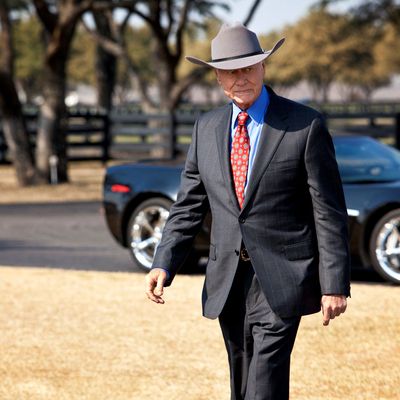
“I spend my whole life hating the man, and now I don’t know how to feel.” That’s Gary (Ted Shackelford), talking to the late, great, horrible J.R. Ewing’s brother, Bobby (Patrick Duffy), in last night’s Dallas, a farewell episode that put the old rascal to rest after 35 years of scheming.
The viewer had no such ambivalence. J.R. was a great soap-opera villain — a cowboy-hatted Richard III in the show’s CBS incarnation, and a kind of malevolent King Lear on TNT’s 21st-century follow-up, older and slower but still formidable. It hurt to say good-bye to J.R. because he was always the liveliest character on the show, and because Larry Hagman — who died last November at 81 — played him with wicked wit and dark gravitas right up to the end stretch, during which the actor had few lines and often filmed sitting in a chair, nearly immobile save for the occasional Heat Miser eyebrow-waggle. (Hagman died just five episodes into the TNT show’s second season and was in increasingly frail health during shooting. Supposedly the producers employed some Livia-on–The Sopranos CGI and some editing and sound-effects trickery to extend his presence.)
If you don’t follow the new Dallas, there’s not much point digging too deeply into the plotlines that set up J.R.’s onscreen death. The short version: J.R. died in Mexico even though he’d told his son and presumptive antihero-replacement John Ross (Josh Henderson) that he was in Abu Dhabi negotiating oil contracts. The previous episode ended with J.R. phoning John Ross, then getting gunned down off-camera right after warning (or bragging) that his latest scam would be his “masterpiece.” Based on the memorial episode, it seems as though J.R. was trying to find incriminating information about Texas transportation mogul Harris Ryland (Mitch Pileggi) and learn the whereabouts of Pam Ewing (played by Victoria Principal, and later by Margaret Michaels), the adoptive mother of Christopher (Jesse Metcalfe). (Pam was written out of the story near the end of Dallas’s CBS run, but has never been declared dead on the show.) Dallas’s producers have promised that the “J.R.’s Masterpiece” plotline will be wrapped up by episode fifteen of this season. Patrick Duffy, a.k.a. Bobby Ewing, told an audience at a recent Paley Center event that the end of the tale is “the pinnacle of Dallas writing and plot,” for whatever that’s worth.
Not that anybody watching last night’s funeral episode cared too much about plot mechanics. The hour was mainly about grief and nostalgia, and about acknowledging how TV characters colonize our subconscious. The show’s cheerfully bombastic opening theme was MIA, replaced by a muted, mournful brass version. J.R.’s pre-funeral cocktail reception — which predictably and hilariously turned into a brawl when the old man’s nemesis Cliff Barnes (Ken Kercheval) showed up — doubled as a memorial for Hagman. Many of the “family photos” arrayed throughout the reception area were actually Dallas publicity stills dating back to the eighties. Throughout, there were repeated close-ups of the late scalawag’s self-named vanity brand of bourbon. These felt like a rare instance of a literal-minded show indulging (very effectively) in metaphor: Characters drank J.R.’s spirit by drinking his spirits.
The new Dallas has generously employed actors from the original series. Plenty showed up last night, including Charlene Tilton as J.R.’s niece Lucy; Deborah Shelton as Mandy, one of the old reptile’s mistresses; and Cathy Podewell as Callie, his second wife. The episode was dominated by J.R.’s first wife, Sue Ellen (Linda Gray), a recovering alcoholic, Texas gubernatorial candidate, and co-conspirator with John Ross in a gambit to take over Ewing Energy. J.R. had a handwritten letter delivered to Sue Ellen in advance of his demise. She carried the envelope around throughout the episode’s first half while struggling to stay on the wagon; she eventually fell off and admitted as much at the funeral, a tear-soaked affair that acknowledged J.R.’s brute honesty and intoxicating life force as well as his vile selfishness. “He was as bad as they come, but he was hot as hell,” Callie said at a pre-memorial cocktail reception, studying a photo of young J.R. “He was hot as hell because he was as bad as they come,” Mandy countered. They were both right.
It also hurt to say good-bye to J.R. because he’s been around as long as (or longer than) most of the people watching the new Dallas. For viewers of a certain age, the TNT version inspires a mix of affection and melancholy: It’s great to see these actors again, and hey, they look good! followed by, Geez, they’re all so much older now, and so am I, and guess I should get that weird mole checked out. When you virtually bury a character that you’ve lived with for most of your life, you can’t help but think about your own past, present, and future. Art and life, drama and spectatorship blurred in “J.R.’s Masterpiece.” The final shot of Bobby, the George Bailey of Southfork Ranch, weeping for J.R. was devastating because it compressed so many different kinds of grief into a single image: a brother crying for a brother, a good man crying for a bad man, an actor crying for a colleague, and a fellow Dallas fan mourning the end of an era. Ask not for whom the bell tolls, pardner.


